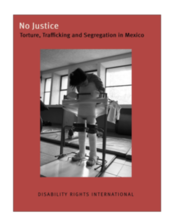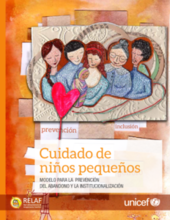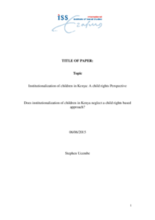Displaying 471 - 480 of 771
This interpretive study examines the experiences of 54 Ethiopian emerging adults who had aged out of institutional care facilities.
This report from Disability Rights International (DRI) outlines the findings from a two-year investigation into the treatment of children and adults with mental disabilities in Mexico City, particularly those in the care of state-funded and private residential facilities.
This study investigates the correlation over time between international adoption and institutional care.
This video reveals the adverse conditions in the many unregistered orphanages in Haiti
This study examined psychopathology at age 12 years in a cohort of Romanian children who had been abandoned at birth and placed into institutional care, then assigned either to be placed in foster care or to care as usual.
This post on the Missions Dilemma website features an article and 30 minute documentary film on the harmful impact of institutionalization on children.
The current study seeks to examine the social images associated with children and youth in residential care and the respective care institutions in Portugal.
This essay examines institutional care not as a structure or facility, but as a model of care and protection for orphans and vulnerable children in Kenya.
In this executive summary, the Truth and Reconciliation Commission of Canada provides an introduction to the use of residential schools for aboriginal children in Canada, presents an overview of the Commission’s activities, describes the history and legacy of these residential schools, and outlines the challenges of reconciliation, including 94 recommendations, or “calls to action” for reconciliation in the field of Child Welfare among many others.



